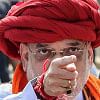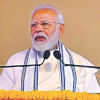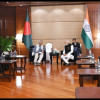India’s Thin-Skinned Leaders

Indian Prime Minister Narendra Modi's government has long been overly sensitive to world opinion, partly because Modi himself craves outside approval. The ruling Bharatiya Janata Party (BJP) likes to claim that India receives more international accolades now that Modi is in charge than it did under his predecessors. But in three recent instances, the attention was less than flattering – and the BJP government responded like prickly adolescents.
The most recent incident began when the BBC aired a documentary titled India: The Modi Question, which explored the prime minister's culpability for the anti-Muslim riots in Gujarat in 2002, when over a thousand people were killed. The government's response has shown it at its most belligerent, as well as its most defensive.
Anxious to shield Modi from the damning charges, government ministers and officials attempted to discredit the BBC, suggesting that the documentary was a politically motivated attempt to tarnish India's image just when it had assumed the G20's rotating presidency. The spokesman for the Ministry of External Affairs, Arindam Bagchi, decried the film as a "propaganda piece designed to push a particular discredited narrative."
The government also sought to prevent the documentary from being seen widely in India, including by ordering Twitter to remove links to it and getting YouTube to remove uploads. Nor has Modi's government been above petty retaliation. The authorities conducted a tax raid on the BBC offices in New Delhi and Mumbai, confiscating phones and laptops in an episode widely viewed as yet another effort to stifle press freedom.
A similarly extreme overreaction came last November, after the Israeli filmmaker Nadav Lapid disparaged the controversial BJP-supported film The Kashmir Files, which tells the fictional story of a young man who learns that his Kashmiri Hindu parents died at the hands of Islamist militants. Lapid, heading the jury at the International Film Festival of India, expressed his embarrassment at such a "vulgar" work of "propaganda" being screened at a prestigious festival and argued that it did not match the "cinematic richness, the diversity, and complexity" of the other films in the competition category.
The BJP government's extraordinary hypersensitivity is a trait that one would associate with immature individuals who lack a strong sense of self, not with official institutions. To see government officials behave this way – particularly in a democracy where criticism routinely flies in all directions – is bizarre, to put it mildly.
It was an artistic and aesthetic judgement that Lapid was perfectly entitled to make. Yet, the Modi government and its defenders fired back, falsely accusing Lapid of demeaning the suffering of the Kashmiri Pandit community (Hindus displaced and killed by Islamist terrorists). They also pressed the Israeli ambassador to denounce Lapid, and transferred out of the Film Festival Directorate the hapless official who had invited the filmmaker to head the jury. Needless to say, Lapid is unlikely to receive another visa, let alone invitation, to visit India as long as the BJP remains in power.
Yet, another petulant overreaction from Modi's government came last May, when experts at the World Health Organization (WHO) reported, based on an analysis of excess deaths, that Covid-19 fatalities in India could be up to 10 times higher than officially reported. Whereas the Indian government claimed that half a million people had died as a result of the pandemic in 2020 and 2021, the WHO estimated the true figure could be some three to five million.
Here, too, the Indian government launched a full-scale counterattack, with officials challenging the integrity, bona fides, and even statistical methodology of the WHO, a United Nations body whose intergovernmental executive committee had been headed by India's own health minister during the pandemic. The government's numbers, its representatives insisted, were perfectly accurate; any other deaths during the pandemic were the result of unrelated causes.
The BJP government's extraordinary hypersensitivity is a trait that one would associate with immature individuals who lack a strong sense of self, not with official institutions. To see government officials behave this way – particularly in a democracy where criticism routinely flies in all directions – is bizarre, to put it mildly.
Modi's government has conflated its aversion to criticism with its obligation to protect India's national honour, to the detriment of the latter. National honour is a precious asset, but not every negative statement about anything Indian damages it. In fact, to respond so belligerently to every perceived slight implies that India's national honour is fragile and insubstantial, rather than deeply rooted and durable. Attempts to sustain a flattering narrative by suppressing facts and figures – a habit that extends to everything: from India's official poverty statistics to details of Chinese incursions into India – can even undermine policy.
India's current government is especially touchy about the perceptions of outsiders. This seems to reflect an awareness that foreigners' criticism is particularly likely to be well-founded, rather than politically motivated, and thus not easily dismissed or discredited. Desperate to prevent its carefully cultivated global image from being tarnished, Modi's government reacts to foreign slights that most other governments would simply ignore.
India's government should not only be able to withstand criticism; it should encourage a culture of dissent, based on an unshakeable belief in people's right to take opposing views and challenge orthodoxies. It should be able to accept criticism in stride and, when appropriate, seek to engage constructively with critics. In the aforementioned incidents, for example, Indian officials should have affirmed that its critics are entitled to their views, with which the government does not agree. In some cases, they might even acknowledge that we can learn from our critics.
Acting as if all criticism is illegitimate is the hallmark of a banana republic, not a mature democracy. The Modi government's behaviour thus amounts to a betrayal of India's traditions. And to what end? By overreacting, questioning the good faith of foreign critics, and even seeking to suppress unflattering stories, the Modi government has succeeded only in drawing more attention to the criticism and exposing its own vulnerability.
Shashi Tharoor, a former UN under-secretary-general and minister of state, is an MP for the Indian National Congress.

 For all latest news, follow The Daily Star's Google News channel.
For all latest news, follow The Daily Star's Google News channel. 










Comments